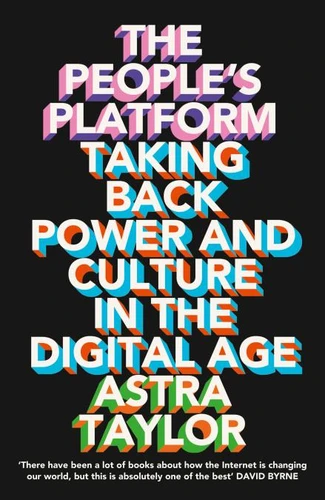The People’s Platform. Taking Back Power and Culture in the Digital Age
Par :Formats :
Disponible dans votre compte client Decitre ou Furet du Nord dès validation de votre commande. Le format ePub protégé est :
- Compatible avec une lecture sur My Vivlio (smartphone, tablette, ordinateur)
- Compatible avec une lecture sur liseuses Vivlio
- Pour les liseuses autres que Vivlio, vous devez utiliser le logiciel Adobe Digital Edition. Non compatible avec la lecture sur les liseuses Kindle, Remarkable et Sony
- Non compatible avec un achat hors France métropolitaine
 , qui est-ce ?
, qui est-ce ?Notre partenaire de plateforme de lecture numérique où vous retrouverez l'ensemble de vos ebooks gratuitement
Pour en savoir plus sur nos ebooks, consultez notre aide en ligne ici
- Nombre de pages288
- FormatePub
- ISBN978-0-00-752560-7
- EAN9780007525607
- Date de parution15/04/2014
- Protection num.Adobe DRM
- Infos supplémentairesepub
- ÉditeurFourth Estate
Résumé
From a cutting-edge cultural commentator, a bold and brilliant challenge to cherished notions of the internet as the great leveler of our age.
The internet has been hailed as an unprecedented democratising force, a place where everyone can participate.
So why are minorities and marginalized groups under-represented on user-generated websites, with less than 15% of Wikipedia written by women?
Why does keyword-jammed and star-studded churnalism proliferate, at the expense of in-depth, investigative journalism?
And how have a handful of giant corporations like Facebook, Google and Apple seized control of our creativity, galvanizing individuals to produce content for free?
'The People's Platform' argues that for all our 'sharing', the internet reflects real-world inequalities as much as it reduces them.
Attention accrues to those who already have it. Cultural products are increasingly valued more as opportunities for data collection for distributors - content creators receive little for their efforts. News filters mean people mistake what interests them for what is really important. And we pay for our 'free' access to content by offering up our personal details to advertisers. The online world does offer a unique opportunity for greater freedom, but a democratic community that supports the diverse and lasting will not spring up from technology alone.
If we want the internet to be a people's platform, we will have to make it so.
Attention accrues to those who already have it. Cultural products are increasingly valued more as opportunities for data collection for distributors - content creators receive little for their efforts. News filters mean people mistake what interests them for what is really important. And we pay for our 'free' access to content by offering up our personal details to advertisers. The online world does offer a unique opportunity for greater freedom, but a democratic community that supports the diverse and lasting will not spring up from technology alone.
If we want the internet to be a people's platform, we will have to make it so.
From a cutting-edge cultural commentator, a bold and brilliant challenge to cherished notions of the internet as the great leveler of our age.
The internet has been hailed as an unprecedented democratising force, a place where everyone can participate.
So why are minorities and marginalized groups under-represented on user-generated websites, with less than 15% of Wikipedia written by women?
Why does keyword-jammed and star-studded churnalism proliferate, at the expense of in-depth, investigative journalism?
And how have a handful of giant corporations like Facebook, Google and Apple seized control of our creativity, galvanizing individuals to produce content for free?
'The People's Platform' argues that for all our 'sharing', the internet reflects real-world inequalities as much as it reduces them.
Attention accrues to those who already have it. Cultural products are increasingly valued more as opportunities for data collection for distributors - content creators receive little for their efforts. News filters mean people mistake what interests them for what is really important. And we pay for our 'free' access to content by offering up our personal details to advertisers. The online world does offer a unique opportunity for greater freedom, but a democratic community that supports the diverse and lasting will not spring up from technology alone.
If we want the internet to be a people's platform, we will have to make it so.
Attention accrues to those who already have it. Cultural products are increasingly valued more as opportunities for data collection for distributors - content creators receive little for their efforts. News filters mean people mistake what interests them for what is really important. And we pay for our 'free' access to content by offering up our personal details to advertisers. The online world does offer a unique opportunity for greater freedom, but a democratic community that supports the diverse and lasting will not spring up from technology alone.
If we want the internet to be a people's platform, we will have to make it so.





